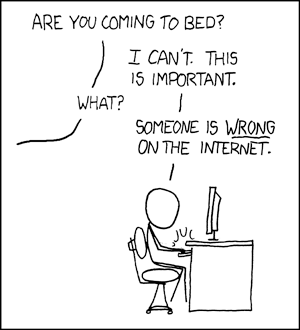
Of all the fights not to get into on the internet, the worst sort is when someone claims a particular label and you argue that they aren’t it. Whatever it is. Feminist. Fat. Liberal. Plus sized. Cyclist. Runner. Introvert.
The thing is when someone claims a label for themselves they’ve got more at stake than you do. It matters to them in ways you might not understand.
Here is one example from my life.
I say I’m a parent and I rarely identify as a mother. Gendered parenting roles aren’t my thing. I don’t entirely abstain from gender. I mostly wear skirts and dresses and I wear lipstick while cycling! But as a parent, my connection to my kids isn’t experienced (for me) as a gendered thing. There’s no “wait till your father gets home” around here. We don’t roll that way. You can correct me and say that technically I’m also a mother, as well as a parent. Fine. But you’re missing out on my perspective on my life. There’s information there that you don’t have. Labels matter especially when it comes to self identification.
Here’s two more that matter to me:

But here the issue is more complicated. It’s about who gets to claim the label “plus sized.”
You’ll recall in my recent blog post about the label “fat” I admitted that sometimes I claimed the label “fat” and sometimes I didn’t. One example of a time when I claim it is when people start opining about the possibility of being fat and fit. Then I stand up proud and say, over here. Look at me. “I weigh x number of pounds and just rode my bike y number of kilometers.”
When don’t I claim the label “fat”? When I worry that relatively smaller fat people like me are crowding out debates and discussion. There’s fat phobia out there in the world that I don’t encounter. I rarely need to seek size accommodation. Regular airplane seats and seat belts fit me just fine and pretty much all clothing stores sell things that fit. I’m fat, yes, but still pretty privileged in terms of my size.
But plus sized seems to me to be a pretty factual label, neutral even. Regular sizes run 0-14. Plus sized is 16 and up. That’s the dividing line in most stores. I’m fat, not plus sized.
So when a friend, a much smaller friend, described herself as plus sized I spoke up and corrected her. You’re size 8, I said. You’re not plus sized.
She pointed out that she feels plus sized. What does that mean? Well, a modeling company she’d spoken to about modeling said they didn’t need any more plus sized models. They saw her as plus sized. People name call her and she’s been bullied because of her size. She’s definitely not thin or skinny. But is everyone who isn’t skinny “plus sized”? Have we lost track of normal?
I’m reminded of a line from the TV show The Good Place about the need for a medium place, nor heaven or hell, but a place for the rest of us who aren’t perfect but aren’t evil either.
Heck, these days people are calling Rhianna plus sized. See Calling Rihanna Plus-Size Could Be The Conversation We All Need.
Here’s Rhianna’s response.
Anyway, the label “plus sized” means something to this young woman. Who am I to decide she can’t claim it? Why do I feel the need to tell her she isn’t plus sized?
What’s your take on these debates about who is and who isn’t plus-sized?
To me that the most jaw-dropping thing in your post is something I already knew but am always shocked when reminded: that a size 8 is plus-sized in the modelling industry.
I don’t think it is by any objective measure plus sized. But your friend’s conviction that she is a plus sized person shows the insidious hold the industry standard has on the mindset of many ordinary and even small women. I think it’s sad.
Right? And the size 14, my size, is average in Canada.
Loved The Good Place! As for sizing our self up I prefer restoring power to the individual to determine how she or he measures themselves. We each have the right to reclaim the labels we wear regardless of the labels placed on us by society; product branding, industry ‘standards’ or bystanders who fling out opinions about our bodies. I happen to like what I wrote in my high school yearbook: I am just as small as all of us, my shadow just as tall.
An abusive husband might convince his wife that she’s hallucinating, but that doesn’t make it true.
“Plus size” has a definition, and size 8 ain’t it, except in the insane world of fashion modeling. That woman needs to assess how she forms her framing of this issue (and, quite likely, other issues as well).
This is a good example of something I’ve always suspected, which is that kids could really use “anti-marketing” teaching – using marketing messages to break down motivating speech, discussing whose needs are being met (or challenged), and so on. I think kids would LOVE it, because they generally really dig “finding out the trick,” and it might be the single best support we could give to the stable working of society.
The language used here is kind of shocking, to be honest. “Regular”-sized? “Have we lost track of normal?”? Your Good Place comparison implies that thin is “good” and fat is “evil.”
Never mind your friend’s thin privilege, this language is damaging and reinforces so many awful and harmful stereotypes about fat people.
Totally didn’t mean it that way. Apologies. Just meant the middle of the range in a non judgey huge. Sorry for the judgey language. Not my usual style.